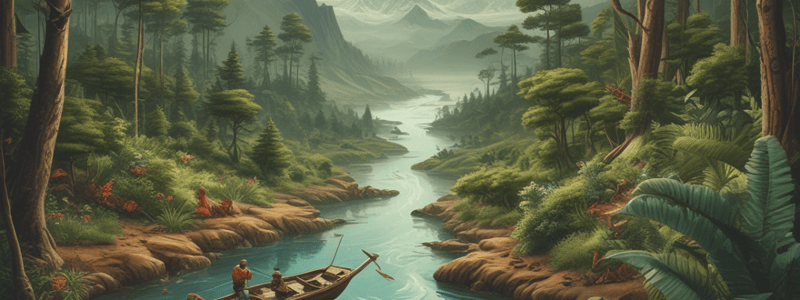Podcast
Questions and Answers
What is the primary human activity responsible for global warming?
What is the primary human activity responsible for global warming?
- Burning fossil fuels (correct)
- Cement production
- Deforestation
- Livestock farming
What is the difference between global warming and climate change?
What is the difference between global warming and climate change?
- Global warming is a short-term change, while climate change is a long-term change
- Global warming is a natural phenomenon, while climate change is human-induced
- Global warming refers to the heating of Earth's surface, while climate change refers to long-term changes in weather patterns (correct)
- Global warming is a local phenomenon, while climate change is a global phenomenon
What is one potential benefit of climate change?
What is one potential benefit of climate change?
- Reduced energy consumption
- Decreased crop production
- Increased crop production (correct)
- Increased winter mortality
What is the most common greenhouse gas?
What is the most common greenhouse gas?
What industry is responsible for the largest amount of methane emissions?
What industry is responsible for the largest amount of methane emissions?
What is the estimated amount of methane emitted by termites annually?
What is the estimated amount of methane emitted by termites annually?
What is the impact of climate change on montane species?
What is the impact of climate change on montane species?
Why are nature reserves becoming less effective?
Why are nature reserves becoming less effective?
What is the impact of climate change on polar bears and breeding seals?
What is the impact of climate change on polar bears and breeding seals?
What is the estimated carbon footprint of cryptocurrencies in 2019?
What is the estimated carbon footprint of cryptocurrencies in 2019?
What is the equivalent of one seal in terms of foraging efficiency?
What is the equivalent of one seal in terms of foraging efficiency?
Which species was declared extinct in 2019 due to rise in sea levels?
Which species was declared extinct in 2019 due to rise in sea levels?
What is the by-product of digestion produced by microbes in melting permafrost?
What is the by-product of digestion produced by microbes in melting permafrost?
What is the estimated carbon footprint of a child living in the developed world?
What is the estimated carbon footprint of a child living in the developed world?
What is the approximate percentage of renewable energy in 2022?
What is the approximate percentage of renewable energy in 2022?
What is the estimated carbon footprint of a 3-bed new build house?
What is the estimated carbon footprint of a 3-bed new build house?
What is the estimated carbon footprint of having a child?
What is the estimated carbon footprint of having a child?
How much do theBritish government pay in child benefits per week for the first child?
How much do theBritish government pay in child benefits per week for the first child?
What is the estimated carbon footprint of a space tourist per minute?
What is the estimated carbon footprint of a space tourist per minute?
What is the estimated amount of food waste in the United States alone that could feed all of the world’s hungry people?
What is the estimated amount of food waste in the United States alone that could feed all of the world’s hungry people?
Flashcards are hidden until you start studying
Study Notes
Global Warming and Climate Change
- Global warming is the long-term heating of Earth's surface due to human activities, primarily fossil fuel burning, which increases heat-trapping greenhouse gas levels.
- Climate change is a long-term change in average weather patterns that define Earth's local, regional, and global climates.
- Global warming is a human-induced climate change, whereas climate change is a natural phenomenon.
Greenhouse Gas Emissions
- Carbon dioxide is the most common greenhouse gas, but other gases are more potent.
- Contributions to greenhouse gas emissions come from industry, roads, housing energy, leaks, and other irregular releases from pressurized containers in the gas and oil industry, cement, deforestation, livestock, and manure.
Habitat Shifting and Alteration
- Montane species' ranges are decreasing upwards, leading to isolation of subpopulations.
- Nature reserves' fixed positions in the landscape are affected by shifting geographical ranges.
Associated Changes
- Decline in ice coverage affects polar bears, breeding seals, and increases swimming distances.
- Reduction in foraging efficiency: one seal is equivalent to 74 snow geese, 216 snow geese eggs, or 3 million berries.
Extreme Weather Events
- Increase in ice coverage prevents narwhals from traveling due to fewer ice-free breathing holes.
- Changes in phytoplankton blooms, drought, storms, flooding, fire regimes, extreme temperatures, and hurricane intensity.
Mitigation
- Forest fires/bushfires and renewable energies like solar, wind, biomass, landfill gas, and hydroelectric power can help mitigate climate change.
- Challenges include retrofitting, social norms, and impact on house prices.
Carbon Footprint
- Carbon harvesting and mechanical trees/forests can extract and store carbon.
- Food waste contributes significantly to greenhouse gas emissions, and reducing food waste can help mitigate climate change.
Individual Actions
- Opening doors, using electronic devices, and having children all contribute to carbon emissions.
- Downsizing houses, using public transport, and reducing energy consumption can help reduce individual carbon footprints.
Studying That Suits You
Use AI to generate personalized quizzes and flashcards to suit your learning preferences.




